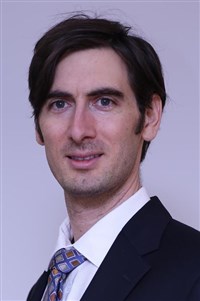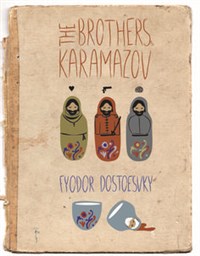John Spencer Hawkins, Assistant Professor, Program in Cultures, Civilizations and Ideas
 BY MELİS ERDEM (ARCH/III)
BY MELİS ERDEM (ARCH/III)
The book that influenced me most was “The Brothers Karamazov,” a thousand-page Russian novel that I read in English translation. My love of foreign languages may have arisen because my first favorite novel was foreign. This book did not persuade me to learn Russian, embrace religion or even read other long novels, but it showed me what mattered to me. I recall how I first heard the name Dostoyevsky; it was when my high school English teacher Mr. Garrett recommended “The Brothers Karamazov,” and someone standing nearby promptly repeated the recommendation. She was a classmate of mine, a rabbi’s daughter and star student with wild hair. At that age, I was not frightened by a long book. Besides, the edition I found had tiny print and looked quite thin.
The book tells the story of a man who sleeps with a mentally disabled “village idiot” and raises his illegitimate son as a servant in his home. The man, Fyodor Karamazov, has the same first name as the novel’s author, but is clearly no hero: he has three other sons by marriage, and he taunts them sadistically. Everyone loves stories about wicked people. As Freud says, adults enjoy stories about outlaws and fanatics who live according to the narcissism that most of us nostalgically miss after giving it up to live as responsible adults.
While the wicked father may have hooked my interest, what held it was his four sons’ stunningly different personalities. I always thought it was a sign of the author’s  genius that he could describe the thoughts of four such different characters, while he himself was only one person. We have little insight into the psychology of the illegitimate son, Smerdyakov. His silence has an important plot function later in the novel; he is a schemer, who does not express himself openly but suffers profoundly. A son by marriage, Dimitri, passionately loves the same woman that his father is chasing. Another, Ivan, is a critical intellectual, who finds fault in everything. The most likable son, Alyosha, becomes a monk in order to dedicate his life to Christian virtue—forgiving everyone, even his father. Each figure goes through crises: Ivan is accused of murdering his father and confronts his need for faith. Dimitri suffers from his obsession over the woman. And after Alyosha’s religious guide dies, the other monks doubt the teacher’s piety because God let his body decompose too quickly after his death. The brothers show their massively different outlooks on the world in the ways they cope with these crises.
genius that he could describe the thoughts of four such different characters, while he himself was only one person. We have little insight into the psychology of the illegitimate son, Smerdyakov. His silence has an important plot function later in the novel; he is a schemer, who does not express himself openly but suffers profoundly. A son by marriage, Dimitri, passionately loves the same woman that his father is chasing. Another, Ivan, is a critical intellectual, who finds fault in everything. The most likable son, Alyosha, becomes a monk in order to dedicate his life to Christian virtue—forgiving everyone, even his father. Each figure goes through crises: Ivan is accused of murdering his father and confronts his need for faith. Dimitri suffers from his obsession over the woman. And after Alyosha’s religious guide dies, the other monks doubt the teacher’s piety because God let his body decompose too quickly after his death. The brothers show their massively different outlooks on the world in the ways they cope with these crises.
The book made me realize that no achievement won my admiration like describing human experience well. While it remains the most influential book in my life, its “favorite” status was buffeted when I was 20 by cruel words in Vladimir Nabokov’s “Lectures on Russian Literature.” I was in awe of Nabokov’s “Lolita,” a study in cruelty more shocking than Fyodor’s, masterfully poised between preciosity and precision. But Nabokov could not have dismissed Dostoevsky more harshly. He wrote that Dostoyevsky should not be taught at all, but that since inexperienced readers might mistake his work for something important, it was worth discussing to prevent people from wasting their time. Dostoyevsky’s crime? Sentimental characters, stupid whimsical imitation of crime novels, disorganized plot structure and mystifying preaching. I could see his points, and I had to admit that I was an inexperienced reader when I picked up this book, but it still remains the novel I needed at age 16. I am now reading Heinrich Mann’s “The Underling,” a literary diagnosis of the Prussian love of authority. I wish it were as fascinating as “The Brothers Karamazov.”
